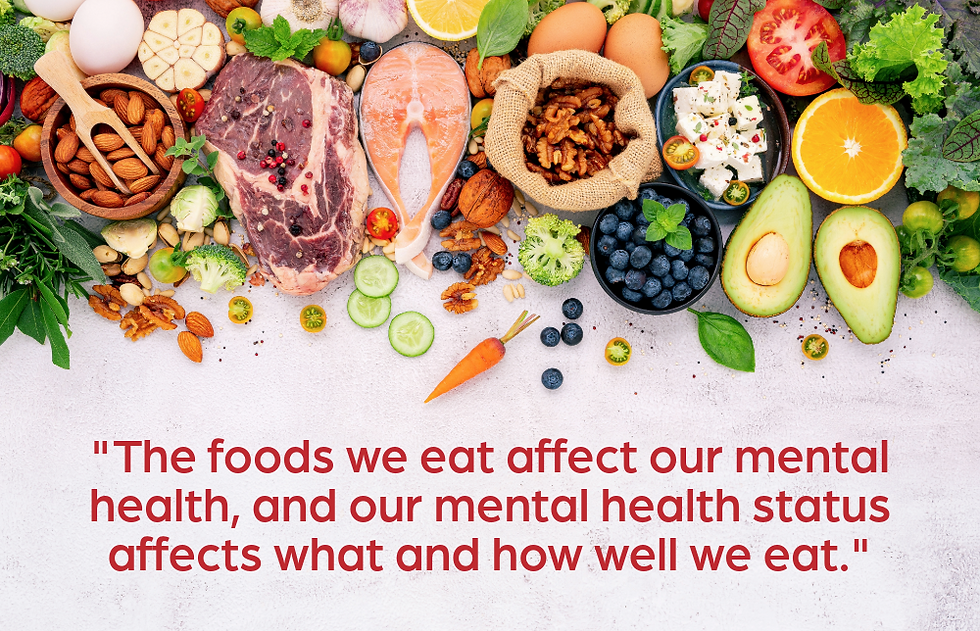Fueling Happiness: The Connection Between Nutrition and Mental Health
- Gurleen Saini
- Jun 29, 2025
- 4 min read
Updated: Jul 12, 2025

Ever noticed how a bag of chips or a slice of pizza can seem like the ultimate mood lifter on a tough day? Comfort food has its appeal, especially when life gets overwhelming. But while these quick fixes may provide temporary relief, they often leave us feeling sluggish and unfulfilled. The real key to sustained happiness and mental well-being might actually lie in your pantry.
The connection between nutrition and mental health is deeper than most of us realize. Emerging research shows that what you eat significantly impacts how you feel—emotionally and mentally. Let’s explore this fascinating link and discover how to fuel happiness with the right foods.
How Food Affects Your Mood
The phrase "you are what you eat" is truer than ever when it comes to mental health. Your brain and gut are intricately connected—a relationship often referred to as the gut-brain axis. This connection explains how the food you consume affects your mood, emotions, and even cognitive functions.
Here’s how it works:
The Role of Gut Microbiota: Your gut is home to trillions of microorganisms that play a crucial role in your overall health. A healthy gut produces neurotransmitters like serotonin and dopamine, which regulate your mood. Nearly 90% of serotonin, the “feel-good” hormone, is produced in your gut.
Inflammation and Mental Health: Certain foods, especially those high in sugar and trans fats, trigger inflammation in the body. Chronic inflammation can affect brain health, leading to anxiety, depression, and cognitive decline. Anti-inflammatory foods, on the other hand, help combat these effects.
Blood Sugar and Energy Levels: A diet rich in processed foods causes rapid spikes and crashes in blood sugar levels, which can leave you feeling irritable, fatigued, and mentally foggy. Consuming balanced meals with complex carbs, proteins, and healthy fats stabilizes energy and mood throughout the day.
The takeaway? Your diet doesn’t just shape your body—it directly impacts your emotional and mental resilience.
Mood-Boosting Foods You Should Try
If you want to feel good from the inside out, stock up on these brain-friendly foods:
Leafy Greens: Spinach, kale, and broccoli are packed with vitamins like folate, which helps produce dopamine and serotonin. They’re also rich in magnesium, a mineral linked to lower anxiety levels.
Fatty Fish: Salmon, mackerel, and sardines are excellent sources of Omega-3 fatty acids, which reduce inflammation and improve brain health. These fats are known to alleviate symptoms of depression.
Berries: Blueberries, strawberries, and blackberries are loaded with antioxidants that protect your brain from oxidative stress. Antioxidants also help combat inflammation and improve memory.
Turmeric: The active compound in turmeric, curcumin, is a powerful anti-inflammatory agent. It boosts mood by increasing serotonin and dopamine levels. Add turmeric to your teas, soups, or curries for a mental health boost.
Dark Chocolate: Rich in flavonoids and magnesium, dark chocolate (70% cocoa or higher) promotes relaxation and reduces stress hormones. A small piece can be a guilt-free indulgence.
Yogurt and Fermented Foods: Probiotic-rich foods like yogurt, kimchi, and kefir improve gut health, which, in turn, enhances mood and cognitive function.
Nuts and Seeds: Almonds, walnuts, flaxseeds, and chia seeds are great sources of Omega-3 fatty acids and other nutrients that stabilize mood and boost brain health.
Whole Grains: Quinoa, oats, and brown rice provide a steady supply of glucose, your brain’s primary energy source. Whole grains also help regulate serotonin levels.
Incorporating these foods into your diet doesn’t just benefit your body—it nourishes your mind as well.

Meal Planning for Mental Wellness
Healthy eating doesn’t have to be expensive or time-consuming. With a little planning, you can create meals that are simple, affordable, and packed with nutrients to fuel your mental health.
Eat a Rainbow: A colorful plate ensures you’re getting a variety of vitamins, minerals, and antioxidants. For example, add red bell peppers, purple cabbage, orange carrots, and green spinach to your meals. The more vibrant your food, the more nutrient-dense it is.
Balance Your Plate: A balanced meal should include:
Protein: Lean meats, eggs, or plant-based options like lentils and tofu.
Healthy Fats: Avocado, nuts, seeds, or olive oil.
Complex Carbohydrates: Whole grains, sweet potatoes, or legumes.
Fiber: Fruits and vegetables for better digestion and gut health.
Quick, Mood-Boosting Recipes:
Spinach and Almond Salad: Toss fresh spinach with almonds, cranberries, and a light vinaigrette. Add grilled chicken for extra protein.
Quinoa Bowl with Roasted Veggies: Cook quinoa and top it with roasted sweet potatoes, zucchini, and chickpeas. Sprinkle with sesame seeds and drizzle tahini dressing.
Smoothie Bowl: Blend frozen berries, a banana, Greek yogurt, and a splash of milk. Top with granola, chia seeds, and dark chocolate shavings.
Breaking Free from Junk Food’s Grip
It’s normal to crave junk food, especially when you’re stressed or tired. The trick is not to eliminate these foods completely but to enjoy them in moderation. Here’s how you can strike a balance:
Plan Your Indulgences: Set aside one or two days a week to enjoy your favorite treats guilt-free.
Replace, Don’t Restrict: Swap chips for air-popped popcorn or sugary sodas for sparkling water with lemon.
Be Mindful: Pay attention to how certain foods make you feel. If junk food leaves you drained or irritable, use that awareness to make healthier choices.
Conclusion
The connection between nutrition and mental health is undeniable. What you eat not only fuels your body but also shapes your emotional and cognitive well-being. By incorporating mood-boosting foods into your diet, you’re giving your brain the nutrients it needs to function at its best.
So the next time you’re tempted to reach for that bag of chips, pause and ask yourself: “Is this really what my body and mind need?” A happy mind starts with a healthy plate, and with mindful eating, you can nourish your way to better mental health—one meal at a time.




Comments